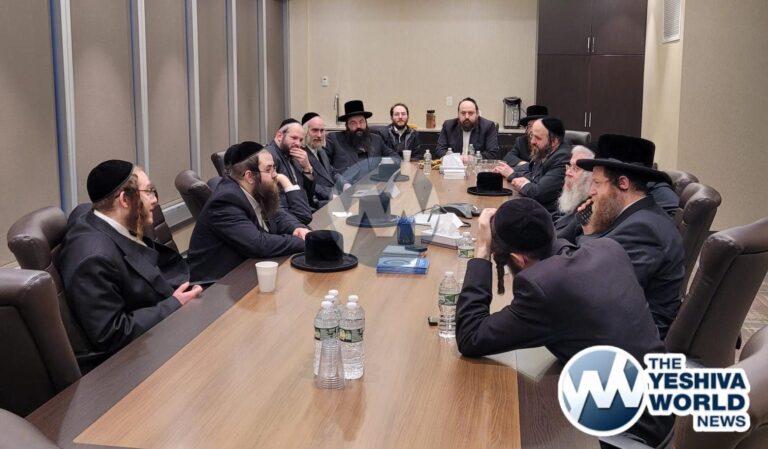(By Rabbi Yair Hoffman for the Five Towns Jewish Times)
Senatorial Candidate Roy Moore. Harvey Weinstein. Sylvester Stallone. Senator Al Franken.
Never before in the history of mankind has the truth of the Talmudic statement in Kiddushin 80b been so universally recognized.
That statement and the commentaries around it, inform us of the prevalence of immoral people (Prutzim). It also tells us that, when dealing with immoral people, certain leniencies to hilchos Yichud, the prohibition of secluding with a member of the opposite gender, simply do not apply.
The constant stream of headlines every day, including major politicians, Hollywood figures, and powerful people from all walks of life, points to the truth of it all. These headlines make it very pertinent and appropriate to carefully review the laws of Yichud.
THE PROHIBITION
Generally speaking it is forbidden for any male above the age of 13 years and a day to seclude or be alone with a female who is at least 3 years old and a day. This is true even if the female is single, and even if she has not reached physical maturity. It is also forbidden to seclude or be alone with two females (there are, however, some exceptions to this.)
Similarly, it is forbidden for a female who is above the age of 12 years old and a day, or for two females to seclude or be alone with a male who is above 9 years and a day.
But what lies behind the prohibition? Did the Torah and the Rabbis forbid Yichud – seclusion out of concern for any form of physical contact, or solely out of concern for more?
Rav Asher Weiss Shlita (Minchas Asher Vol. I #87) cites Rav Elyashiv zt”l as holding that Yichud is out of concern for any form. He himself disagrees with this position and writes that it was out of concern for full-fledged intimacy.
Rav Weiss cites as proof a responsum from Rav Moshe Feinstein (IM EH Vol. IV 65:10). Rav Weiss also notes that Rav Scheinberg’s position was similar to that of Rav Elyashiv.
In the 5753 edition of oraisah #17, Rabbi Mordechai Gross, a Major Posaik in Eretz Yisroel, permits a pilot to fly women alone based on similar grounds to that of Rav Weiss. The current headlines might encourage people to adopt the more stringent position of Rav Elyashiz zt”l.
TORAH LAW AND RABBINIC LAW
Some types of Yichud are forbidden by Torah law, while others types of Yichud are forbidden by Rabbinic law. Sometimes, of course, there is a debate as to whether it is forbidden by Torah law or by Rabbinic law. Regardless, the prohibition of Yichud is its own separate halacha, no matter what may or may not happen.
It should also be known that the prohibition of Yichud does not depend upon a locked door or a closed room. It applies in any situation where there are no others around. This can be out in an open area, in a field or any other place where others are not passing regularly (See Radbaz Vol. I #121).
By Torah law, the prohibition of Yichud is only when there is a prohibition in the two marrying. Thus, a man may not be alone with his wife’s sister, or his wife’s mother.
There is a debate in regard to whether a Kohain is forbidden by Torah law or by Rabbinic law to be alone with a divorcee. This prohibition is of a type known as “Chayavei Lavin” violations of a lav in the Torah. The Prisha (22:1) holds that it is a Torah prohibition. The Minchas Chinuch (186:2) cites opinions that it is only forbidden by Rabbinic decree.
SINGLE JEWISH GIRLS
The Talmud (Sanhedrin 21a) tells us that King David and his Bais Din enacted the prohibition against being alone with unmarried Jewish girls. Thus, the prohibition of seclusion with unmarried women would be Rabbinic. However, since in our days unmarried women do not immerse to remove spiritual impurity, the prohibition of Yichud with an unmarried woman is Biblical.
SINGLE NON-JEWISH GIRLS
The Talmud (Avodah Zarah 36b) also tells us the House of Shammai and the House of Hillel enacted that one may not be alone with a non-Jewish single woman. The issue of seclusion with a married non-Jewish woman is a debate as to whether it is a biblical prohibition or a Rabbinic prohibition (See Minchas Chinuch 188:5 and Pischei Teshuvah EH 16:1).
JEWISH WOMAN WITH A GENTILE
It is also forbidden for a Jewish woman to seclude or be alone with a gentile (based upon the Mishna Avodah Zarah 22a and cited in SA YD 153:4 and EH 22:3). If it is a married woman the prohibition is clearly biblical . If it is a single woman, then it is generally viewed as a Rabbinic prohibition.
All of this is in terms of the actual prohibition of Yichud. There may also exist an issue of Chinuch, education of the Mitzvah for children, where Yichud is forbidden even for a boy who is less than 13 and even for a girl who is less than 12. Finally, there is also an opinion that the sages forbade cases of seclusion between a minor and a gentile .
THE LENIENCIES OR HETERIM
There are, however, nine categories of heterim, leniencies or exceptions to the prohibition. They are:
1. Immediate Family – With one’s immediate family, there is no problem or prohibition of Yichud. Therefore, a] a daughter may seclude with her father; b] a mother may seclude with her son; c] a sister may seclude with her brother (but not for a period of more than 30 straight days) and d] a woman who is in a state of halachic impurity may seclude with her husband. These heterim were extended to include a granddaughter, grandson and grandmother .
2. One’s Wife Guards a Person – When a man’s wife is with him, it is permitted for another female other than his wife to be alone with them . Indeed, it is not just the wife that guards a person – even if the man was with his mother, sister or daughter, the heter or leniency still applies. The reason is that their presence, generally speaking, ensures that he will act properly.
3. Two Kosher Men – An Ashkenazic woman may seclude herself or be alone with two upright, kosher men. The definition of upright or kosher is that they scrupulously observe Jewish law – especially the prohibition against touching women. A Sefardic woman, however, may only seclude herself with three men – not two men.
4. One Man and Three Women – A woman may be alone with or seclude herself with another man if there are two other women who are also present.
5. Many Men and Many Women – If there are many men and many women present, then there is no prohibition of Yichud.
6. Husband in Town – If the woman’s husband is in town, then there is also no prohibition of Yichud . The reason is that the fear of her husband is upon her . There is a debate in the Poskim if the wife is in a friend’s home, and the husband does not know where she is. The Dovaiv Mesharim permits it, while the Chochmas Adam forbids it.
7. Open Doorway to Public – if there is an open doorway to the public area, there is no prohibition of Yichud . There is a debate among the Poskim, however, as to what the term “Open Doorway” or “pesach pasuach” in Hebrew actually means. Some hold that the door merely needs to be unlocked . This was also the position of the Chazon Ish . Others, however, are more stringent and actually require the door to physically be open . Another issue is whether people generally would enter – even if it is unlocked. The Poskim have written that if it is the social norm for a person not to enter even if the door is unlocked, then this does not prevent Yichud . Others have ruled that it depends upon whether the Yichud is Biblical Yichud or Rabbinically forbidden Yichud. When it is a Yichud forbidden by the Torah one should not rely upon the leniency of an unlocked door.
The Poskim have also ruled that the leniency of the open doorway is not effective at nighttime .
8. Five Pairs of Women Who Will Not Cover Up for Each Other – Halacha discusses five types of relationships, wherein the general nature of that relationship will generally ensure that one will not cover up for the other. Consequently, there would be no prohibition of Yichud with two women in such a case. Thus, it is permitted for Yichud to take place when one of the two women is the mother-in-law or daughter-in-law of the other, the sister-in-law of the other (even through marriage), the step-daughter of the other, or the co-wife (no longer applicable) of the other.
9. A Chaperone – A woman may seclude with a man or the other way around if there is a child that is present as well. The child must be between the ages of five and nine years old . It can be a boy or a girl . There is also no need for the child to be related to any of the people involved .
Part III – Exceptions to the Leniencies
To these leniencies or heterim – there are eight possible exceptions found in the Talmud and in the Rishonim, the early commentaries. These exceptions, however, were only said in the context of one specific leniency. Do they apply to all of the nine leniencies mentioned above? Some do, and some don’t. And some are the subject of Halachic debate. In fact, there are some exceptions to the prohibition, where it is not clear at all as to which of the nine leniencies the exception actually references.
1. Akum – The leniency of “One’s Wife Guards a Person” is understood by the Gemorah in tractate Avodah Zarah (25b) as applying only to Jewish people . Therefore,Yichud would not be permitted if there if only a gentile man and his wife are present.
2. Prutzim – Loose People – The Gemorah (Kiddushin 80b) tells us that when dealing with loose people, the leniency of “Two upright men” does not apply. In fact, a woman may not be alone with ten or one hundred loose men.
3. Traveling – The Gemorah (Kiddushin 81a) further tells us that when traveling, the leniency of “two upright kosher men” also does not apply. The reason is that one of the men may need to use the facilities and the other man and woman will be left alone.
4. Night Time – The Raavad, a Rishon of Posquirres Italy, extends the Gemorah’s exception regarding travelling to also include night time. At night, he writes, the leniency of “two upright kosher men” does not apply because one of them may fall asleep. The view of the Raavad has been accepted as a halachic norm.
5. Fond of Her – The Gemorah (Kiddushin 81a) tells us that the leniency of “Husband is in town” does not apply when the man that would be alone with her is particularly “fond of her.” What does “fond of her” mean? If he grew up with her or has developed some other type of relationship with her, then there is still a prohibition even if the husband is in town.
6. Business is With Women – The Mishna (Kiddushin 82a) indicates that if a man’s occupation or business is with women, this too constitutes an exception to the leniency or heter. There is a debate, however, as to which leniency is being referenced .
7. Warned Her Not to Seclude – The Trumas HaDeshen writes that when a woman was warned by her husband not to be alone or seclude with a certain man, the leniencies or heterim of “Husband in Town” and “Open Doorway to Public” do not apply.
8. Regularly – The Gemorah explains that the allowance for a woman to seclude with her brother is only on a temporary basis. If it occurs more regularly or on a more permanent basis, it is forbidden. How much is more regularly? The highly revered Rav Meir Arik zt”l ruled that it is for more than 30 days . Rav Elyashiv zt”l agreed to the position of Rav Meir Arik. The general custom is to rely upon this view. There are two other views, that of Rav Moshe Feinstein zt”l who rukled that it is equivalent to the average stay of a regular guest (about one week). Finally, there is a third view that it is for no more than three days.
As mentioned earlier, however, some of these eight exceptions may be extended to some of the other nine leniencies discussed in Part II.
Source for Prohibition
Most authorities hold that Yichud is a Torah prohibition . However, according to most authorities, the parameters of the Torah prohibition are only when there is one man and one woman . The Gemorah in Kiddushin (80b) demonstrates that the Torah alluded to the prohibition in Sefer Dvarim (13:7) . There are, of course, women of whom Yichud is only forbidden by Rabbinic decree.
Time Frame for the Prohibition
There is a wide range of halachic opinion as to the minimum time frame of the prohibition. Dayan Weiss writes (Minchas Yitzchok Vol. IV #94) that it is five minutes. Other Poskim write that it is two minutes. Rav Moshe Feinstein (Igros Moshe EH Vol. IV 65:22) distinguishes between the case of “Fond of Her” and other cases, where he rules that the other cases may be longer. He therefore rules that there is no halachic problem of Yichud in an elevator. There is a view that the minimum time frame is 37 seconds. This view, however, has not been treated as normative halacha. But, as mentioned earlier, current headlines might make everyone rethink this.
ANOTHER FACTOR
Although it is generally not listed as a heter, Rav Yisroel Belsky zt”l once added that being in constant contact with someone else via a cell phone is a mitigating factor.
CONCLUSION
The headlines that we have been subjected to for the past number of weeks should cause us all to take this prohibition quite seriously. The reader is cautioned not to rely solely upon this article or other publication, but to speak to one’s own Rav or Posaik.
The author can be reached at [email protected]
1 See Trumas HaDeshen #242 and Ramah EH 115:4.
2See Shaivet HaLevi Vol. V #204
3 See, however, the responsa of the Noda BiYehudah MT EH Siman 18 “V’hinei B’Siman” who differentiates between the leniency regarding a daughter’s daughter and is stringent regarding a son’s daughter.
4 Shulchan Aruch EH 22:3.
5 SA EH 22:8
6 It is interesting to note that Rashi (Kiddushin 81a) indicates that the leniency of husband in town is not to permit the prohibition, but rather to exempt her from the punishment of lashes. Indeed, the Bach rules that it is forbidden. However, the majority of Poskim have followed the view of the Shulchan Aruch that it is a leniency, see TaZ 22:7, Kitzur Shulchan Aruch
7 Cited by Sefer Dvar Halacha 7:2 and 7:3
8 Chochmas Adam 126:6
9 SA EH 22:9
10 Responsa of Mabit Vol. I #287; Radbaz Vol. I #121 Binyan Tzion I #138; Maharsham II #76 in the notes. It is interesting to note that some of those who hold of the lenient view have a reading of the responsa of the Rashba Vol I #1251 that reads accordingly. Others, however, believe that a textual error has crept into the text of the Rashba. Instead of it reading “v’hagafas dlasos sh’amarta ain zeh yichud ad sh’ye’he bayis naul” they correct the text to be “ain zeh yesod ad sh’ye’he bayis naul”
11 See Kraina D’Igrasa of his brother-in-law, the Steipler Gaon, Volume II Siman 122.
12 This is the position of both the Bais Meir (cited in responsa of Rabbi Akiva Eiger #100) as well as that of Rabbi Akiva Eiger himself in responsa 101. See also Bais Shlomo OC Vol. I #48.
13 Radbaz Vol. I #121
14 Ruling of Rav Pam zt”l as heard by this author.
15 See Chochmas Adam 126:7; Kitzur Shulchan Aruch 152:5 and Nidchei Yisroel by the author of the Mishna Brurah 24:7.
16 The exact age is not provided in the source Gemorah (Kiddushin 81b) nor in the early Meforshim. The Chochmas Adam (115:9) provides the top age of nine. Responsa Chsam Sofer EH Volume II #96 writes that it begins at age five in regard to a similar halacha. Some Poskim differentiate between a girl, who may qualify at age five versus a boy who would qualify later. It is said that the Chazon Ish ruled that it depends upon the maturity of the child.
17 This is the ruling of the majority of Poskim notwithstanding the indication of the Shulchan Aruch 22:10 that it may seem to be only a girl. See Ramah YD 192:4; Chochmas Adam 126:5,9 and Nidchei Yisroel 24:9.
18 See Tzitz Eliezer Vol. VI 40:16:5.
19 SA EH 22:3
20 Rashi explains that it is an exception to One Man and Three Women. Tosfos holds that it is an exception to “One’s Wife Guards Him.” The Ramban and Ritvah hold that it is an exception to “Two Kosher Men.” And the Rambam holds that it is, in fact, not an exception.
21 Imrei Yosher Vol. II #43. Rav Arik was one of the leading Poskim of the generation (1855-1926).
22 Rashi and Tosfos, Shabbos 13a; Rashba Vol. I #587; Sefer HaChinuch #188; Tur, EH Siman 22. It should be noted that the Rambam Issurei Biah 22:2 writes that it is MiDivrei Kaballah. There is great debate, in general, what he means with this phrase.
23 See Rashba Vol. I #587; Responsa Chavas Yair #73; Chochmas Adam in BA 126:16. The Maharshal in his Yam Shel Shlomo Kiddushin #20 is of the opinion that it is biblical even with one man and two women.
24 The Keren Orah (Shabbos 13a) also writes that the verse, “Do not come close to reveal Ervah” forbids Yichud biblically.
The author can be reached at [email protected]












6 Responses
So the goyim (and frei Jews) should adopt our (okay, it’s really Ha-Shem’s halachas, we merely follow them) traditions involving prohibitions of negiah and yichud, and the press will have nothing to talk about except legitimate news.
To Rabbi Hoffman, לבו גס בה it would seem should not be translated as “fond of her” but rather comfortable with her.
“The current headlines might encourage people to adopt the more stringent position of Rav Elyashiz zt”l”
“But, as mentioned earlier, current headlines might make everyone rethink this.”
“The headlines that we have been subjected to for the past number of weeks should cause us all to take this prohibition quite seriously.”
Why is what certain grobbe goyim do of interest to frum Yidden. Why is this a factor in whether one should be machmir or meikil. There was always a halocho of prutzim, as the article states. One would have to be stupid not to categorise someone in hollywood as a porutz. What bichlal is the chidush which the author is trying to bring out of these headlines as though what he heard surprises him.
The only chiddush is that the goyim care enough about morality and it isn’t completely hefker by them so that things like this can be used by their enemies to bring them down. By the romans I don’t think anyone would’ve batted an eyelid at this type of thing
“He himself disagrees with this position and writes that it was out of concern for full-fledged intimacy.”
Mai nafka minah? Ein apitropus l’arayos!
“Mai nafka minah? Ein apitropus l’arayos!”
He stated a nafka mina: “In the 5753 edition of oraisah #17, Rabbi Mordechai Gross, a Major Posaik in Eretz Yisroel, permits a pilot to fly women alone based on similar grounds to that of Rav Weiss.”
I thought this was interesting: The atmosphere around sexual harassment has become so charged on Capitol Hill that one male lawmaker told USA TODAY there’s even been discussion among some lawmakers and staff about whether male members should have a “witness,” or a third person present whenever they are in the company of young female staffers.